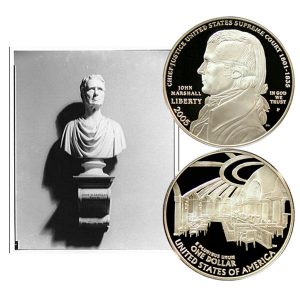Today, the Chief Justice John Marshall Commemorative Silver Dollar Coin remembers when President John Adams commissioned the highest judicial office on January 31, 1801.
From The Life of John Marshall by Albert Jeremiah Beveridge, published in 1916:
=====
Marshall’s appointment as Chief Justice was not greeted with applause from any quarter; there was even a hint of Federalist resentment because Paterson had not been chosen.
“I see it denied in your paper that Mr. Marshall was nominated Chief Justice of the U.S. The fact is so and he will without doubt have the concurrence of the Senate, tho’ some hesitation was at first expressed from respect for the pretensions of Mr. Paterson.”
The Republican politicians were utterly indifferent; and the masses of both parties neither knew nor cared about Marshall’s elevation.
The Republican press, of course, criticized the appointment, as it felt bound to attack any and every thing, good or bad, that the Federalists did.
But its protests against Marshall were so mild that, in view of the recklessness of the period, this was a notable compliment.
“The vacant Chief Justiceship is to be conferred on John Marshall, one time General, afterwards ambassador to X. Y. and Z., and for a short time incumbent of the office of Secretary of State. . . . Who is to receive the salary of the Secretary of State, after Mr. Marshall’s resignation, we cannot foretell, because the wisdom of our wise men surpasseth understanding.”
Some days later the “Aurora,” in a long article, denounced the Judiciary Law as a device for furnishing defeated Federalist politicians with offices, and declared that the act would never be “carried into execution, . . . unless” the Federalists still meant to usurp the Presidency. But it goes on to say: —
“We cannot permit ourselves to believe that John Marshall has been called to the bench to foster such a plot. . . . Still, how can we account for the strange mutations which have passed before us — Marshall for a few weeks Secretary of State ascends the bench of the Chief Justice.”
The principal objection of the Republican newspapers to Marshall, however, was that he, ” before he left the office [of Secretary of State], made provision for all the Federal printers to the extent of his power. . . . He employed the aristocratic presses alone to publish laws . . . for . . . one year.”
Only the dissipated and venomous Callender, from his cell in prison, displayed that virulent hatred of Marshall with which an increasing number of Jefferson’s followers were now obsessed.
“We are to have that precious acquisition John Marshall as Chief Justice. . . . The very sound of this man’s name is an insult upon truth and justice”; and the dissolute scribbler then pours the contents of his ink-pot over Marshall’s X. Y. Z. dispatches, bespatters his campaign for election to Congress, and continues thus: —
“John Adams first appointed John Jay in the room of Ellsworth. A strong suspicion exists that John did this with the previous certainty that John Jay would refuse the nomination. It was then in view to name John Marshall: first, because President Jefferson will not be able to turn him out of office, unless by impeachment; and in the second place that the faction [Federalist Party] who burnt the war office might, with better grace, attempt, forsooth, to set him up as a sort of president himself. Sus ad Minervam!”
That the voice of this depraved man, so soon to be turned against his patron Jefferson, who had not yet cast him off, was the only one raised against Marshall’s appointment to the highest judicial office in the Nation, is a striking tribute, when we consider the extreme partisanship and unrestrained abuse common to the times.
Marshall himself, it appears, was none too eager to accept the position which Ellsworth had resigned and Jay refused; the Senate delayed the confirmation of his nomination; and it was not until the last day of the month that his commission was executed.
On January 31, 1801, the President directed Dexter “to execute the office of Secretary of State so far as to affix the seal of the United States to the enclosed commission to the present Secretary of State, John Marshall, of Virginia, to be Chief Justice of the United States, and to certify in your own name on the commission as executing the office of Secretary of State pro hac vice.”
It was almost a week before Marshall formally acknowledged and accepted the appointment.
“I pray you to accept my grateful acknowledgments for the honor conferred on me in appointing me Chief Justice of the United States. This additional and flattering mark of your good opinion has made an impression on my mind which time will not efface. I shall enter immediately on the duties of the office, and hope never to give you occasion to regret having made this appointment.”
Marshall’s acceptance greatly relieved the President, who instantly acknowledged his letter:
“I have this moment received your letter of this morning, and am happy in your acceptance of the office of Chief Justice.”
…
=====
The Chief Justice John Marshall Commemorative Silver Dollar Coin shows with an image of his bust located in the old Supreme Court room.
